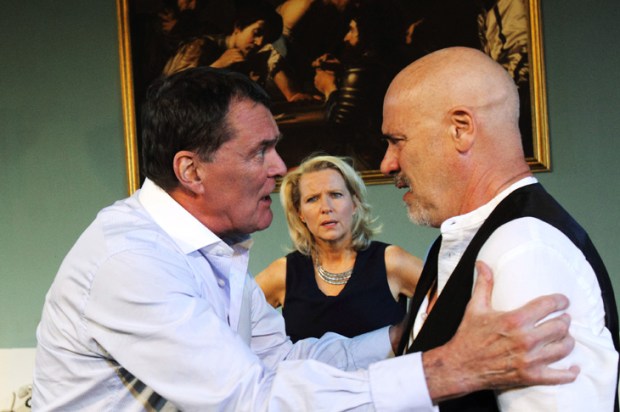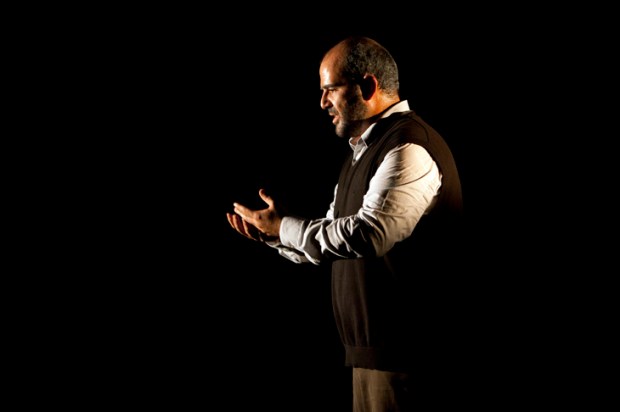Florian Zeller has been reading Pinter. And Pinter started out in repertory thrillers where suspense was created by delaying revelations until the last minute. He tried an experiment. Suppose you delay the revelations indefinitely. The results were interesting. Pinter’s characters were vague, stark silhouettes lacking background and substance. Audiences found them inscrutably suggestive. Zeller follows suit. He presents us with a bourgeois marriage. The father works. The mother sits at home being stylishly empty-headed. Their grown-up son lives with his girlfriend. No other details are offered. It’s evening. Mother, disported on an all-white sofa, greets her husband and languidly interrogates him about his day’s activities and casts aspersions on his fidelity. He refuses to confirm or deny her accusations. The son pays a visit. Did that nasty girlfriend kick you out? asks the Mother. She pours poison in his ear about the girlfriend’s multifarious sexual indiscretions. This is all very weird and amusing. Then it becomes incredible. The Mother puts on her foxiest scarlet dress and begs her son to take her out on a hot date. Chic restaurants and dance clubs are suggested. Clearly the woman is loopy. This resolves a question posed by the surroundings. The house is obsessively white. The walls, the floor, the furniture, and the plain linen jimjams favoured by the Mother, are as bleached-out as a padded cell. The girlfriend arrives. She’s beautiful and knows it. That’s all we learn about her.
And there you have the play. Three blank gestures supporting a nutcase. Instead of living up to Pinter’s oblique strangeness Zeller declines into oddball banality. The dad is a baffled scowl, the girlfriend is a preening minx and the son is a self-regarding tumescence. The Mother, being off her head, is licensed to do or say anything because the author has disclaimed any need to provide her with rational motives. And he gets tricksy. He shows us two scenes (a failed strangulation and an adulterous grope), which he then retracts on the understanding that they were ‘dream sequences’. Even primary-school children are warned against using this device. With good reason. Watching a play (or reading a book) is a creative act. The viewer labours to generate sympathy with the characters, to imagine that the storyline is real, and to be aroused by the emotions on display. To trifle with that effort, to erase its accumulations of energy and involvement, is to commit a breach of trust.
Zeller writes like one of those tinkering football managers who substitutes the top-scorer and then replaces the substitute. The crowd on press night fidgeted, coughed and thumb-twiddled as the 90-minute jape drew to a close. But I predict great things for The Mother. It has the biddable imprecision of conceptual art. And because it means nothing every opinion about it is correct. That’s the secret of success: tell the audience they’re infallible.
Robert Ross’s play Jeepers Creepers offers us scenes from the life of Marty Feldman. He was the co-author, with Barry Took, of the hit radio show Round the Horne and he contributed to one of British comedy’s greatest achievements, the four Yorkshireman sketch. His appearance as Igor in Mel Brooks’s Young Frankenstein propelled him to the heights of international stardom. Men found him hilarious and unthreatening. To women he was irresistible. He began hanging out with Keith Moon and Sam Peckinpah while he directed and starred in his own movies. David Boyle plays Feldman as a loveable, wisecracking drifter and though he captures the warm, comfortable voice very well he can’t get the crackle and electricity of his presence.
The Feldman spirit proves inimitable. And that famous mug is a bit of a challenge as well. To suggest his bulgy left eye would take an extraordinary feat of prosthesis. To suggest his even bulgier right eye would take a miracle. This play isn’t in that league. Ex-Python Terry Jones directs the script with film-like subtlety and quietness. The tragedy unfolds at a low murmur. Feldman drinks whisky night and day, even while directing the surreal farce The Last Remake of Beau Geste. Yet he never seems to get inebriated or even merry. The closing scene shows him alone in a hotel in Mexico chatting amiably to his wife over the phone while his latest project, Yellowbeard, falls to pieces. The film was the brainchild of Graham Chapman, who assembled a list of stars including Peter Cook, John Cleese, Spike Milligan, Eric Idle, James Mason and David Bowie. It was a disaster. Feldman hears that ‘Cleese has walked’ and realises that the film is about to crash and burn. He sets off for England but succumbs to a heart attack. He was 48. But it wasn’t just the whisky. He chuffed his way through 36,500 cigarettes every year.
Got something to add? Join the discussion and comment below.
Get 10 issues for just $10
Subscribe to The Spectator Australia today for the next 10 magazine issues, plus full online access, for just $10.














Comments
Don't miss out
Join the conversation with other Spectator Australia readers. Subscribe to leave a comment.
SUBSCRIBEAlready a subscriber? Log in